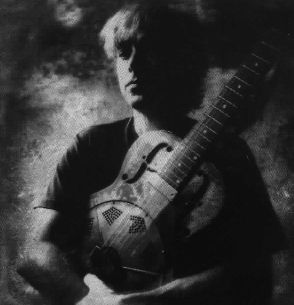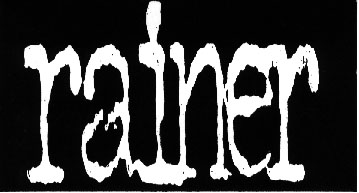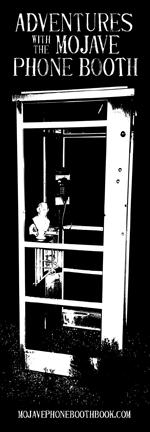Deuce of Clubs interviews Rainer Ptacek
(First published in Planet Magazine, 06jun1995)
|
Rainer Ptacek
7jun1951—12nov1997
R.I.P.
|
"Robert Johnson himself, were he to be miraculously resurrected, could hardly hope for better press than the American blues guitarist Rainer has recently received."
Such was the observation of one Irish magazine concerning the universal
acclaim European music critics have piled on Arizona's own Rainer
 Ptacek. Oddly enough, the German-born Rainer, a former member of
Tucson's Giant Sand and sometime leader of the mysterious Das
Combo, has played Phoenix only a couple of times—which is
Phoenix's loss, because Rainer isn't your average local bluesman
pumping out the same old sounds. His music—particularly the
acoustic stuff—is almost uniquely appealing: there's a spooky
strangeness to it, a little bit Ry Cooder, a little bit Willie
Johnson, and, as his European fans all know, a whole lot Robert
Johnson.
Ptacek. Oddly enough, the German-born Rainer, a former member of
Tucson's Giant Sand and sometime leader of the mysterious Das
Combo, has played Phoenix only a couple of times—which is
Phoenix's loss, because Rainer isn't your average local bluesman
pumping out the same old sounds. His music—particularly the
acoustic stuff—is almost uniquely appealing: there's a spooky
strangeness to it, a little bit Ry Cooder, a little bit Willie
Johnson, and, as his European fans all know, a whole lot Robert
Johnson.
For Rainer, comparison to Robert Johnson is the ultimate
form of compliment. "Robert Johnson was the first thing that
really took the top of my head right off," he remembers. "I mean,
I'm of the generation that came of age musically in the 60s. I
was very influenced by English blues bands—Fleetwood Mac, John
Mayall, the Rolling Stones. The first couple of Rolling Stones
albums were great records. And then, of course, you start reading
where these songs were taken from, and logically everything kind
of points back to Robert Johnson."
While Johnson "is still number one," another of Rainer's
favorites is J. B. Lenoir, whose song "Voodoo Music" appears on
Rainer's latest CD, D.Y.O. "[Lenoir's] got songs that would
just blow your mind! His acoustic recordings I would put right up
there with Robert Johnson. And there are not very many people
that can touch Robert Johnson."
Rainer has a real sense of the history of the blues, and a
genuine fan's love for it, which you can hear in his voice as he
talks about it. "There was this session where Willie Dixon came
over to [Lenoir's] house, and you can actually see—if you close
your eyes—the tape recorder on the kitchen table. And here's
Willie Dixon singing harmony parts to these songs that, of
course, he knows by heart because he's been friends with J. B.
for all these years and he's been out to the clubs and played
these same damn songs in the clubs. And here they are at the
kitchen table and they're singing together and it's just
beautiful."
Unfortunately, such recordings aren't always easy to find—
in America. "The ones that were released in this country became
cut-outs after a year or two," he says. "They're really hard to
find. The stuff that's easier to find is [Lenoir's] Chess
recordings, where he did these band recordings, these Chicago-ish
kind of band recordings. Which are okay, if you like that Chicago
sound, that kind of Little Walter/Muddy Waters kind of thing. But
his later recordings are all-acoustic recordings, with nothing
but maybe his wife playing finger cymbals or somebody on a snare
and a high-hat in the background."

It's odd that the blues—the quintessential American
music—should be more popular in Europe than in America, and that
many essential blues recordings, such as Lenoir's, should be
available in America only as imports. But Europeans "are totally
into blues music. They're brought up to respect American music—
jazz music, blues music—as some holy kind of thing, because it's
unusual to them, an exotic kind of thing." One thinks of
Josephine Baker and Billie Holiday, who a couple of generations
ago found an acceptance in Europe that they could not find back
home. "Right. Almost like we recognize English pop bands;
anything that's not local is put on a pedestal," Rainer says.
"Even [European] kids that you would look at and never suspect
that they knew what they were talking about come up with these
names of recordings that you would never have heard of: `Oh, did
you hear of such-and-such on such-and-such date with so-and-so?'
`Uh...no, I haven't.' They're like, `Oh, you should check it out,
it's really good!'" Rainer must love combing European used record
stores. "Yeah. They've got a lot of great stuff. I mean, all the
best recordings, it seems like, are import. It's kind of
sad."
Rainer himself still has no American record deal, yet he's
philosophical about his lack of impact in America thus far.
"People from your home town are usually the last to recognize
you, and you have to go outside and be recognized on some other
metaphoric `stage' and then come back home in order for people to
say, `Oh yeah, I knew that guy when he played at such-and-such.'
But that never would have happened if the guy hadn't played the
same things in town for all those years."
Rainer counts many notables among his fans across the
Atlantic (such as Robert Plant, with whom Rainer has recorded),
but though he jokingly refers to himself as "world famous...in
Holland," Europe's guitar hero still holds down a day job back in
the states, repairing guitars at a Tucson music shop. But Rainer
isn't the typical day-job-hating musician. "I like my day job,"
he says. "The work that I do is very rewarding for me. It's
working with my hands, fixing things. I like that, bringing
broken instruments back to life. I've been doing that for the
last twenty-some years, so by now there's like, nothing that
really scares me about it."
Rainer may not want to ditch his day job, but that doesn't
mean he's ditched his hopes for success in America. "I would like
to get to the point of being able to tour in the states. That
would be nice, having a record out in the states. That would be
really nice. But I'm old enough to realize that things like that
happen very rarely, where someone comes and hands you your record
contract on a silver platter and everything turns out wonderful.
It's kind of like these dreams of winning the lottery. And then
when you actually win the lottery, you lose all your friends and
nobody likes you and you wish you never would have won the thing.
So I'm kind of realistic about the music business. It's a screwy
business. And as far as wanting to give up my day job—I
like my day job." So we can count on Rainer staying in
Tucson? "Yeah. I like it down here. It's a great place."
© Deuce of Clubs
|


 Ptacek. Oddly enough, the German-born Rainer, a former member of
Tucson's Giant Sand and sometime leader of the mysterious Das
Combo, has played Phoenix only a couple of times—which is
Phoenix's loss, because Rainer isn't your average local bluesman
pumping out the same old sounds. His music—particularly the
acoustic stuff—is almost uniquely appealing: there's a spooky
strangeness to it, a little bit Ry Cooder, a little bit Willie
Johnson, and, as his European fans all know, a whole lot Robert
Johnson.
Ptacek. Oddly enough, the German-born Rainer, a former member of
Tucson's Giant Sand and sometime leader of the mysterious Das
Combo, has played Phoenix only a couple of times—which is
Phoenix's loss, because Rainer isn't your average local bluesman
pumping out the same old sounds. His music—particularly the
acoustic stuff—is almost uniquely appealing: there's a spooky
strangeness to it, a little bit Ry Cooder, a little bit Willie
Johnson, and, as his European fans all know, a whole lot Robert
Johnson.